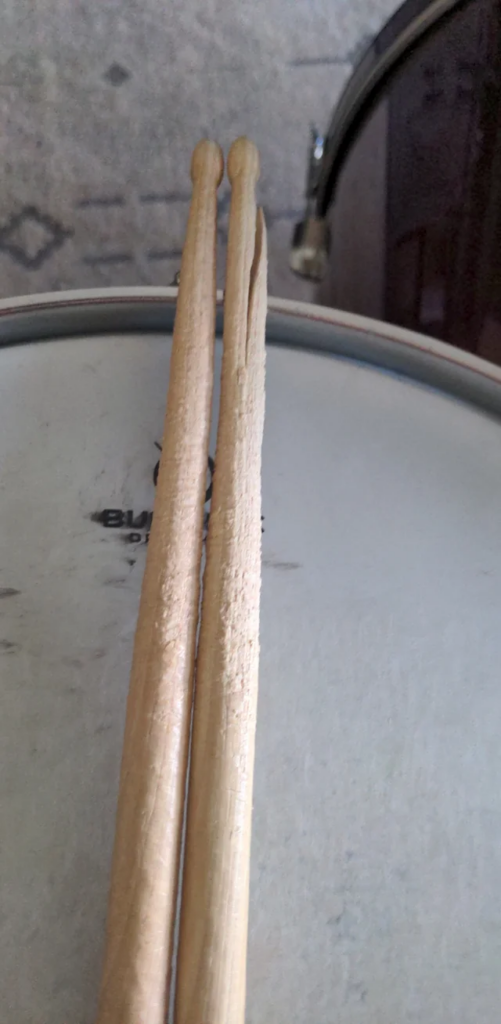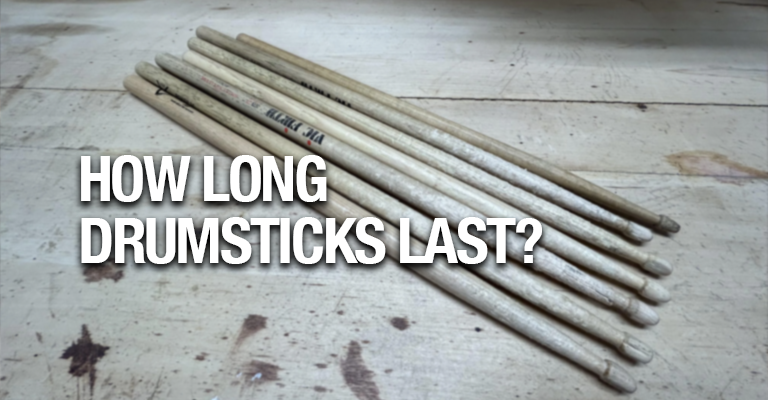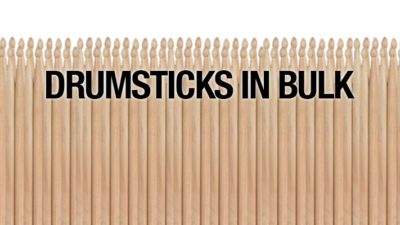Ever wonder how long should drumsticks last before they break, chip, or feel off? It’s one of those things no one really tells you when you start playing.
When I first started, I had no clue what was normal. I thought maybe I was hitting too hard… or maybe the sticks were just trash. Turns out, the truth is somewhere in between – and pro drummers know exactly how to manage it.
Drumstick lifespan depends on way more than just how hard you play. Your grip, your gear, the angle of your cymbals and even the wood type – all factor into how long a stick should survive. And while broken drumsticks are part of the game, replacing them constantly doesn’t have to be.
In this guide, I’ll break down what’s actually normal, what shortens stick life fast, and what pros do differently to make their sticks last longer (without holding back their playing).
Most drumsticks last 1–4 weeks of regular use. Grip, playing style, and gear all affect lifespan – pro players know how to manage all three.
What’s a Normal Drumstick Lifespan?
So… how long should drumsticks last if you’re playing regularly?
For most drummers, a solid pair of sticks should hold up anywhere from one to four weeks of consistent use. But that window depends on a bunch of variables – some you can control, and some you can’t.

If you’re a casual player practicing a few hours a week, your sticks might last a month or more. If you’re gigging hard, hitting heavy, and logging hours every day? You might go through a pair every week and that’s still totally normal.
Average Lifespan Breakdown (Realistic Estimates)
| Playing Situation | Expected Lifespan |
|---|---|
| Light practice (pads only) | 4–6 weeks or longer |
| Moderate use (2–3 hrs/week) | 3–4 weeks |
| Regular kit practice (4–6 hrs/wk) | 2–3 weeks |
| Gigging + practice (heavy) | 1–2 weeks |
| Hard-hitting metal drummer | Several days to 1 week |
The key here isn’t to obsess over a perfect number – it’s to understand what’s normal for your style. You don’t need to feel bad if you’re burning through sticks faster than your buddy who plays fusion jazz with 7As.
If your breakage feels excessive or totally random, the rest of this guide will help you figure out why. But if your sticks are lasting a few weeks and only showing natural wear? You’re probably doing just fine.
And if you’re not sure you’re even using the right stick to begin with, definitely check out our Drumsticks 101 guide for help matching your size, grip, and style to the right pair.
Why Some Drumsticks Break Way Too Soon
If your sticks are snapping after just a few sessions, or worse -within hours, then something’s off. Good sticks, even with regular use, shouldn’t explode mid-fill unless there’s a clear reason behind it.

I’ve been there. I used to think every pair I bought was defective. But in reality, it was my playing habits, setup, and stick choices working against me.
Usual Cause For Premature Drumsticks Breakage:
- Bad Cymbal Angles
Hitting cymbal edges straight-on is a stick killer. You want to strike with a glancing motion, not a full-on attack. - Over-Gripping
Holding your sticks too tightly kills natural rebound and forces all the shock into the shaft. It’s like asking your sticks to break. - Cheap or Mismatched Sticks
Bargain bin bundles often use poor wood quality and aren’t matched by weight or pitch. That inconsistency leads to weak spots and faster breakage. - Wrong Stick for the Job
Using a 7A maple stick in a metal band is just asking for trouble. Heavier genres need stronger sticks like 5B or even 2B in hickory or oak. - Old or Damaged Drumheads/Cymbals
Cracked hoops or chipped cymbal edges will chew through your sticks faster than you think.
What Pro Drummers Do Differently to Make Sticks Last
Here’s the thing: pro drummers break sticks too. But not nearly as often as you’d think. And it’s not because they’re holding back.
They just play smarter.

Over the years, I’ve noticed a few consistent habits that separate seasoned drummers from beginners when it comes to stick durability. These aren’t hacks or gimmicks – they’re just good habits that add up to longer stick life (and less gear frustration).
1. They Match the Stick to the Style
Pros aren’t using a single pair of sticks for every gig. They choose the right stick size and material for the type of music they’re playing.
- Jazz? Lighter maple or 7A hickory.
- Rock? 5B hickory or oak.
- Metal? 2B or signature heavy-duty models.
They know using a stick that’s too light for a heavy-hitting gig is like using a pencil to hammer in nails.
Not sure where to start? Check out Drumsticks for Every Style to see what works best based on your genre.
2. Their Grip Is Relaxed but Controlled
You rarely see a pro clenching their sticks. They’ve trained their hands to hold tight enough to stay in control but loose enough to allow natural rebound. That balance means less shock and less stress on the stick—and their hands.
If your grip feels tense or you’re not sure you’re holding the stick right, revisit Drumstick Weight & Rebound to make sure you’re not compensating for a poor match.
3. Their Gear Is Maintained
This is a big one: pros maintain their gear. They keep cymbals angled properly, change drumheads when they start to go, and make sure no jagged edges are waiting to chip their sticks. It’s basic stuff, but it goes a long way.
If your rim is cracked or your cymbal stand is locked too tight to move freely, your sticks are absorbing all the damage.
When It’s Time to Replace Your Drumsticks
Even if you’re doing everything right: great grip, solid gear, the right sticks for your style – drumsticks don’t last forever. Wood wears down. Tips chip. Shafts get dented. The key is knowing when to let go before they snap mid-song or do damage to your gear.
I used to push my sticks way too far. One time, a stick literally broke mid-ride hit and flew across the kit. Luckily no gear or people were harmed, but it was a loud reminder that waiting too long to replace drumsticks is never worth it.
Signs It’s Time to Retire a Pair
- Splintering or fraying wood – especially near the tip or shoulder
- Cracks you can see or feel when flexing the stick gently
- Worn-down tip that no longer gives a clean cymbal response
- Unbalanced feel between hands (from weight loss or warping)
- Flat spots or heavy dents from rimshots or cross-stick playing
- Buzzing or dull sound when you drop one on a hard surface
Pro Tip:
Don’t wait for a stick to snap to call it done. Replace it when it’s compromised – not destroyed. Most pros rotate sticks regularly and replace them as soon as feel or balance is off, even if they’re not fully broken.
Tips to Make Your Drumsticks Last Longer
You don’t have to baby your gear or stop hitting hard to get more out of your sticks. It’s more about small adjustments and being aware of what’s actually wearing them down.
You can find some great tips in drumstick buying guide from Sweetwater.
Here are the things I do now that’ve helped me stop chewing through sticks like snacks:
1. Use the Right Stick for the Job
Don’t bring 7As to a metal gig. If you hit hard, use thicker sticks like 5B or 2B in hickory or oak. Matching your stick to your style is the easiest way to prevent early breakage.
Check out our guide on choosing drumsticks if you’re not sure what size or material fits your setup best.
2. Tilt Your Cymbals
Straight-on cymbal hits are brutal on tips. Tilt your cymbals slightly toward you so you’re glancing off the edge instead of hammering it directly.
3. Relax Your Grip
A death grip adds pressure to the stick and your hands. Stay loose, let the stick rebound, and your sticks (and wrists) will thank you.
4. Rotate Your Sticks
Every few sessions, switch your left and right sticks. This evens out wear and helps them last longer, especially if you do a lot of rimshots on one side.
5. Inspect Your Kit
Look for sharp edges on cymbals, cracked drum hoops, or dead practice pads. Even minor gear issues can destroy sticks if ignored.
6. Keep a Backup Pair
This doesn’t directly extend stick life, but it saves your set when one breaks. Always have at least one backup pair within reach.
Final Thoughts
So, how long should drumsticks last? The honest answer is: it depends.
Most players can expect a solid pair of sticks to hold up for 1 to 4 weeks of regular use – more if you’re careful, less if you’re smashing crash cymbals every few minutes.
But that’s not a bad thing. Breaking sticks isn’t always a sign of poor technique. It’s often a sign you’re putting in the time, playing with passion, and growing as a drummer. Still, that doesn’t mean you want to throw money at new sticks every other day.
A few smart habits, like matching your sticks to your playing style, loosening your grip, tilting your cymbals, and checking your gear – can make a huge difference in how long your sticks last.
If you’re still figuring out which stick type fits your needs, or just want a deeper understanding of what affects performance and durability, don’t miss our complete Drumsticks 101 guide. It’s the foundation for smarter stick choices.



